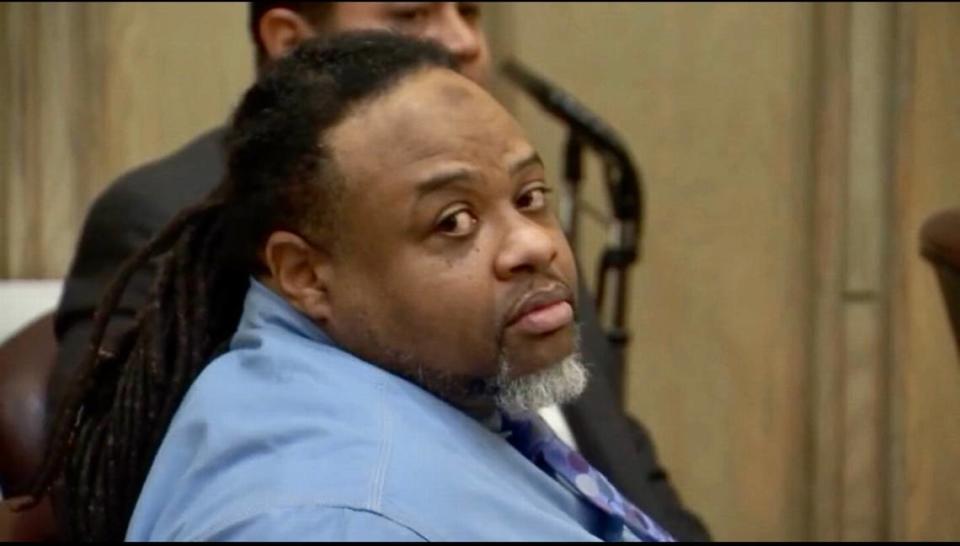Miami-Dade jury deadlocked, sparing accused killer possible death sentence under new law
For the second time in a decade, a judge declared a mistrial in the case of accused killer Robert Holton, charged with stabbing, burning and strangling a young Naranja woman to death in her apartment.
Late Thursday afternoon, almost 24 hours after a dozen jurors began deliberations, Miami-Dade Circuit Judge Marisa Tinkler Mendez said she had no choice but to halt the proceedings after receiving a third note from jurors saying they were deadlocked.
The family of Kayla Gloster, who state prosecutors say was brutally killed by Holton during a jealous rage, left the courtroom after being told of the mistrial moments before the proceedings came to an official close. Outside the courtroom, emotions flared. Some cried. Others held onto each other. Gloster’s mother Tangela Gloster hyperventilated, forcing worried family members who had surrounded her to seek help.
Miami-Dade Assistant State Attorney Scott Warfman answered “yes” when asked if the state would try the case again, as he was leaving the courtroom. Gloster’s grandmother Karen Dickson said God had a plan.
“This is not the end,” she said. “It’s a mistrial, not he walking out free. They’re going to have to get the right jury.”
But defense Attorney Jimmy Della Ferra said he was hoping to avoid another trial — especially since a new law was passed in April that no longer required a unanimous jury vote to put someone charged with a capital offense to death. He said in time and before another trial, he’d like to work out some type of plea agreement with the state.
“I think it makes all the sense in the world,” Della Ferra said.
If an agreement isn’t worked out, Judge Tinkler Mendez said it would be at least a year before Holton is likely to stand trial for a third time. Holton’s first mistrial came after the lead detective accidentally told jurors Holton was brought in to police headquarters because he was wanted for another crime, a statement that could have slanted jurors.
Holton, 42, was charged with first-degree murder and first-degree arson for the murder of 22-year-old Gloster in 2013. Prosecutors say he killed her during a jealous rage over another boyfriend. They said DNA tests detected Holton’s blood in five different places in the apartment. The odds of someone else matching the blood type found to be Holton’s inside the apartment, an expert testified, was 2.7 quadrillion to one.
But though they said she was stabbed, strangled and set ablaze, they never pinned down exactly what killed her, leaving it to a combination of all her injuries.
Throughout the trial, Della Ferra planted seeds of doubt as to the state’s contention that she drowned in her toilet, which would have opened the door for premeditated murder, a condition of first-degree murder. Instead, the defense attorney told jurors he believed she bled to death after being stabbed. The defense attorney also questioned why her other boyfriend wasn’t investigated as intensely as Holton.
If Holton had been convicted of first-degree murder, the trial could have been a milestone in Miami-Dade, with jurors only needing an 8-4 vote during sentencing to send him to his death. That meant Holton could have been the first person in Miami-Dade sentenced to death without a unanimous vote since the state of Florida changed its rules in April. The new law, approved by state legislators, was sparked by Gov. Ron DeSantis’s disappointment with the life sentence handed down to Parkland high school killer Nikolas Cruz last October.

In April, after DeSantis and parents of murdered Marjory Stoneman Douglas Senior High students expressed outrage with a jury’s decision to spare the life of school shooter Nikolas Cruz, legislators voted for the most radical death penalty rules of any state in the nation. The only other state that doesn’t require a unanimous vote is Alabama, where a person can be sentenced to death by 10 or 12 jurors.
The rules surrounding Florida’s death penalty have fluctuated for decades. When the penalty was originally reinstated in 1976, only a simple majority was required for death. But state legislators changed the requirement to unanimous after a 2016 U.S. Supreme Court case determined Florida judges had too much power in capital cases. In 2020, a mostly new set of Supreme Court justices overturned the 2016 ruling, opening the door for the legislature’s recent decision.
Though Holton could have been the first person sentenced to death by a less than unanimous vote in Miami-Dade in almost a decade, at least two others in Florida have received a death sentence since April.


